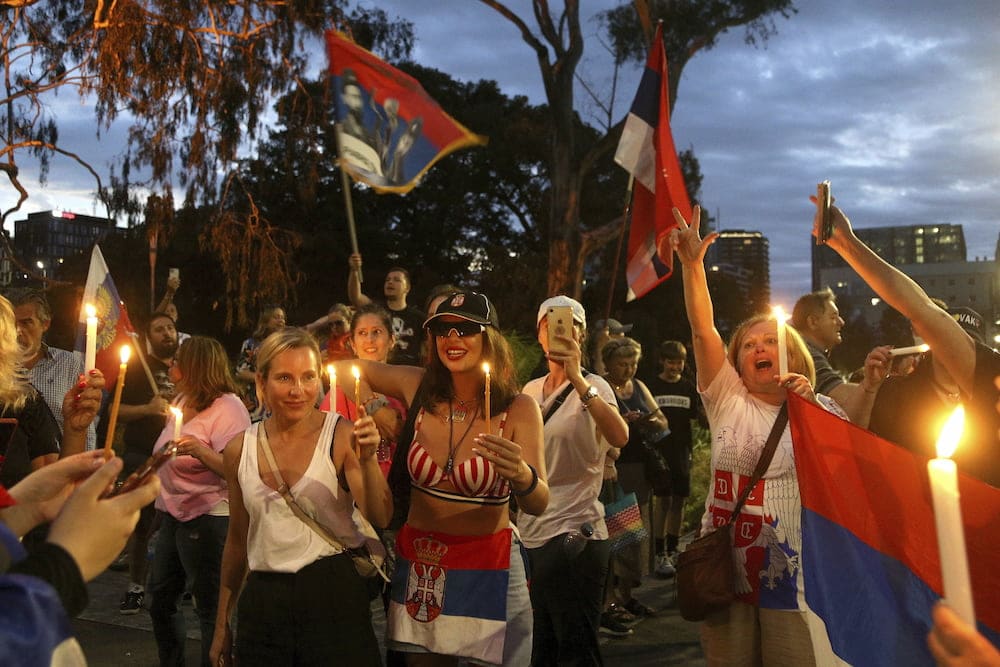The Australian Open has been dealt a further blow with Home Affairs Minister Karen Andrews revealing two other international players are being investigated after Novak Djokovic’s visa was deemed invalid.
Andrews said the Australian Border Force, which she oversees, were looking at other players who have travelled to Australia in similar circumstances for the Open.
“I can confirm the Australian Border Force is conducting its inquiries … I am aware that there are two individuals currently being investigated by Australian Border Force,” Andrews told Channel Seven.
Andrews said anyone entering Australia had to show evidence of vaccination or medical reasons why they are not vaccinated.
“But we do have the intelligence to indicate there are some individuals here now that have not met the entry requirements and we have to investigate that,” Andrews said earlier on the Nine Network.
“I know there is a lot of chatter about the visa. The visa, on my understanding, is not the issue, it is the entry requirement.
“The Border Force has been very clear that he (Novak) was not able to meet the requirement to provide the evidence he needed for entry to Australia.”
The world No.1 faces another three days in an immigration detention hotel in Melbourne amid one of the great modern sports controversies, waiting for a legal ruling over whether he can defend the Australian crown he’s won nine times.
Beyond the quiet of his hotel, the outcry in his native Serbia over the treatment of Djokovic is growing with his family saying he had been “held captive” in Australia and insisting the treatment of one of sport’s greatest performers was a disgrace.
Nearer to home, former Davis Cup player Paul McNamee who ran the Australian Open from 1995 until 2006 as tournament director, joined those who think the 34-year-old deserved his day on court, not in court.
“It’s not fair. The guy played by the rules, he got his visa, he arrives, he’s a nine-time champion and whether people like it or not he’s entitled to fair play,” McNamee told ABC News.
“There’s no doubt there’s some disconnect between the state and the federal government.
“I hate to think politics are involved but it feels that way.”
Djokovic had travelled to Australia after Victoria state authorities granted him an exemption to the vaccination rules but on arrival on Wednesday night, the ABF rejected the visa.
A court hearing to attempt to stop his deportation is set for Monday at the secure hotel used more often by immigration officials to house asylum seekers and refugees.
“He is the only player that I’ve ever known in the history of the Australian Open that has had his visa rescinded,” said McNamee.
“Players need to know with confidence that if they’re flying round the world to events, there’s not going to be this sort of problem at entry.
“It’s a problem we’ve seen over the last two years in Australia and the victim of that is the No.1 player in the world.
“He was following the rules. Now you might be angry that he was given an exemption, but players need to have confidence that the rules they abide by are going to be enforced.
“It’s not fair to him. Whether you like the rules or not, he doesn’t make the rules – so he deserves his day on court and not in court, in my opinion.”
In Serbia, where Djokovic is idolised as a nation hero, his family held a rally in front of the country’s parliament building in the capital Belgrade, with around 300 fans chanting slogans backing him.
His father Srdjan promised the crowd the protests would be held every day until Djokovic was released.
AAP
Get all the latest Canberra news, sport, entertainment, lifestyle, competitions and more delivered straight to your inbox with the Canberra Daily Daily Newsletter. Sign up here.



